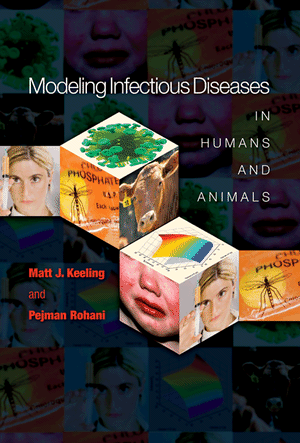|
This program is a clear step away
from simple theoretical models (which are ideal for illustrating
principles) to a more complex applied model which includes many more
realistic features. We consider the SEIR model with four
age-classes and yearly aging, closely matching the implications of
grouping individuals into school cohorts. The four age-classes modelled
are 0-6, 6-10, 10-20 and 20+ years old.
Given that we are aiming for a mechanistic model, we have fixed the
basic demography and only allow the epidemiological parameters to be
altered (although by now you may have enough confidence in your
programming to alter the terms that are fixed within the code).
Key to this model are two basic assumptions:
1) Only individuals in the adult class give birth, and only individuals
in the adult class die.
2) Births and deaths are continuous, but aging only happens once per
year.
The continuous time dynamics are given by:

with the annual aging being given by:

| β |
is the matrix of transmission
rates and incorporates the encounter rate between susceptible and
infectious individuals together with the probability of transmission. |
| σ |
is
the rate at which individuals move from the exposed to the infectious
classes. Its reciprocal (1/σ) is the average latent (exposed) period. |
| γ |
is
called the removal
or recovery rate, though often we are more interested in its reciprocal
(1/γ) which determines the average infectious period. |
| μ |
is
the death rate in each age group; it is assumed that only adults die.
|
| ν |
is
the birth rate into the childhood class; it is assumed only adults give
birth. |
| S(0) |
is
the vector of initial
proportions of the population that are both susceptible and in a
particular age group. |
| E(0) |
is
the vector of initial
proportions of the population that are both exposed and in a
particular age group. |
| I(0) |
is
the vector of initial
proportions of the population that are both infectious and in a
particular age group. |
All rates are
specified
in days.
Requirements.
All parameters must be positive, S(0) + E(0)
+ I(0)
≤
n for each age group.
Files
C++ Program, Python Program, Fortran Program, Parameters, MATLAB Code.
|


